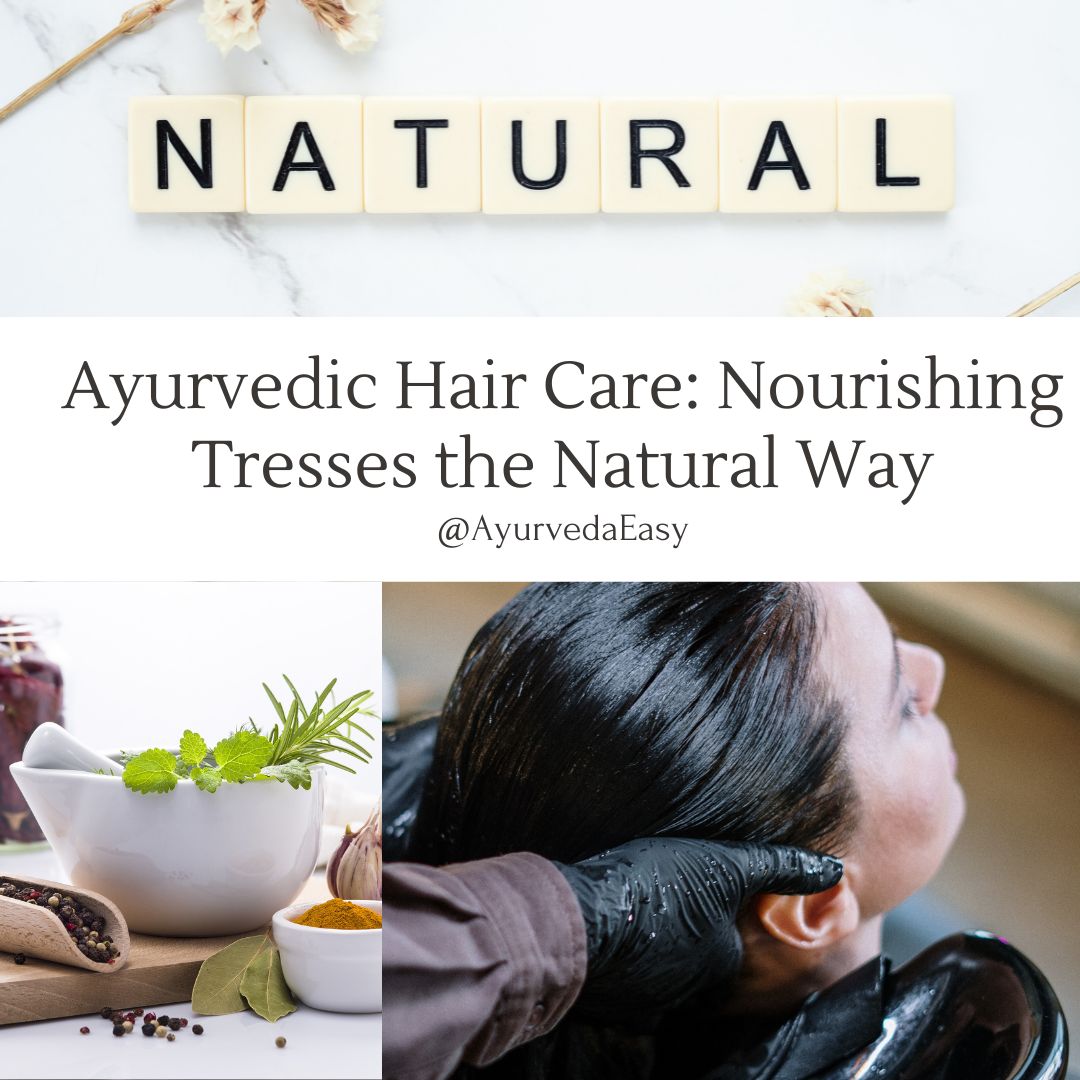Ayurvedic Hair Care: Nourishing Tresses the Natural Way
In the realm of holistic well-being, Ayurveda stands as a time-honored system that transcends mere health management, emphasizing harmony between the body, mind, and spirit. This ancient Indian practice revolves around the belief that balance within the body leads to optimal health, and this philosophy extends seamlessly to the realm of hair care.
Table of Contents
ToggleAyurvedic Principles for Hair Care
At its core, Ayurvedic hair care isn’t just about superficial treatments; it’s a holistic journey that intertwines ancient wisdom with modern aspirations. In Ayurveda, the hair is regarded as an extension of one’s bones, carrying the energy (prana) derived from the food we consume. This perspective sees the hair as a reflection of overall health, making Ayurveda’s approach to hair care deeply rooted in the principles of balance and individuality.
Understanding Ayurvedic Hair Types
Different Hair Types in Ayurveda:
According to Ayurveda, everyone possesses a unique combination of the three doshas – Vata, Pitta, and Kapha – which govern various physiological and psychological aspects. Similarly, these doshas influence hair characteristics, giving rise to distinct Ayurvedic hair types.
Vata Hair:
- Characteristics: Vata-influenced hair tends to be dry, frizzy, and prone to split ends.
- Imbalance Signs: Excessive dryness, brittleness, and increased hair breakage.
- Ayurvedic Care: Nourishing oils and hydrating treatments to restore moisture balance.
Pitta Hair:
- Characteristics: Pitta-dominant hair is often fine, straight, and prone to premature graying or thinning.
- Imbalance Signs: Excessive heat, inflammation, and sensitivity of the scalp.
- Ayurvedic Care: Cooling herbal infusions and protective measures to counteract heat-related issues.
Kapha Hair:
- Characteristics: Kapha-influenced hair tends to be thick, wavy, and prone to oiliness.
- Imbalance Signs: Excessive oiliness, dandruff, and a heavy, congested feeling.
- Ayurvedic Care: Cleansing treatments and lightweight oils to balance oil production.
Tailoring Personalized Care:
Understanding your unique Ayurvedic hair type lays the foundation for a tailored care routine. Rather than adopting a one-size-fits-all approach, Ayurveda encourages individuals to embrace personalized practices that address their specific needs. This nuanced approach involves selecting hair care products and routines that harmonize with the individual’s dosha composition, ensuring optimal balance and vitality.
By acknowledging the intricate interplay between doshas and hair characteristics, Ayurveda empowers individuals to cultivate a deeper connection with their hair. This personalized understanding serves as a compass, guiding individuals toward the most effective and harmonious path to radiant, healthy tresses.
Ayurvedic Ingredients for Hair Care
Overview of Key Herbs and Oils:
Ayurvedic hair care harnesses the potency of nature’s bounty, incorporating a rich tapestry of herbs and oils renowned for their therapeutic properties. Among the stars of this herbal orchestra, Amla, Bhringraj, and Coconut oil take center stage.
Amla:
- Overview: Amla, also known as Indian gooseberry, is a powerhouse of antioxidants and Vitamin C. It has been a staple in Ayurvedic hair care for centuries.
- Benefits: Amla nourishes the scalp, promotes hair growth, and helps prevent premature graying. Its antioxidant-rich nature aids in maintaining overall hair health.
Bhringraj:
- Overview: Bhringraj, often referred to as the “king of herbs for hair,” is recognized for its rejuvenating properties. It is considered a natural tonic for hair.
- Benefits: Bhringraj stimulates hair follicles, strengthens roots, and prevents hair fall. Regular use is believed to promote luscious, voluminous hair.
Coconut Oil:
- Overview: Coconut oil, a staple in Ayurvedic traditions, is celebrated for its moisturizing and conditioning attributes. It penetrates the hair shaft, providing nourishment from within.
- Benefits: Coconut oil adds shine, reduces protein loss, and prevents damage. It’s particularly beneficial for those with Vata-predominant hair due to its hydrating properties.
Benefits for Specific Hair Types:
Tailoring Ayurvedic hair care to specific dosha-influenced hair types ensures maximum efficacy and harmony.
Vata Hair:
- Amla’s moisturizing qualities alleviate dryness in Vata hair, while Bhringraj’s rejuvenating properties combat brittleness.
- Coconut oil, with its deep conditioning, addresses Vata’s tendency towards frizz and split ends.
Pitta Hair:
- Amla’s cooling nature soothes the heat associated with Pitta hair, while Bhringraj’s calming effects help maintain a healthy scalp.
- Coconut oil’s lightweight texture prevents exacerbating oiliness in Pitta-dominant hair.
Kapha Hair:
- Amla’s revitalizing attributes counteract the heaviness of Kapha hair, while Bhringraj’s stimulation combats excess oiliness.
- Coconut oil’s cleansing properties assist in maintaining a balanced oil level in Kapha-influenced hair.
By understanding the unique benefits each ingredient offers, individuals can craft personalized Ayurvedic hair care routines that resonate with their hair’s inherent nature, promoting vitality and resilience.
Ayurvedic Hair Care Practices
Introduction to Daily and Seasonal Routines:
Ayurvedic wisdom extends beyond product choices to encompass daily and seasonal rituals that harmonize with the ebb and flow of nature. Embracing these routines ensures a holistic approach to maintaining healthy hair throughout the year.
Daily Routines:
- Scalp Massage: Regular scalp massages stimulate blood circulation, promoting nutrient delivery to hair follicles. This practice aligns with Ayurvedic principles of enhancing prana, the vital life force.
- Oiling: Applying herbal oils nourishes and strengthens the hair, offering a protective shield against environmental stressors. The choice of oil can be tailored to individual dosha needs.
Seasonal Routines:
- Adapting to Climate: Ayurveda emphasizes adjusting hair care practices based on seasonal changes. For example, during hot months (Pitta season), cooling treatments are favored, while warmer oils may be used in colder months (Vata season).
- Herbal Hair Masks: Seasonal hair masks crafted from herbs suitable for the prevailing dosha influence provide targeted nourishment and balance.
These practices acknowledge the dynamic nature of both individuals and their environment, aligning hair care with the cyclical rhythms of life. Daily and seasonal routines are not only rituals but a reflection of the deep connection Ayurveda seeks to cultivate between individuals and the natural world.
Dietary Tips for Healthy Hair
Importance of Nutrition for Hair Health in Ayurveda:
In the tapestry of Ayurvedic wisdom, the role of nutrition in maintaining healthy hair is paramount. Ayurveda recognizes that the vitality of our locks is intricately connected to the nourishment we provide from within. The food we consume not only fuels our bodies but also influences the quality, strength, and shine of our hair.
Ayurvedic Diet Recommendations:
The Ayurvedic approach to dietary choices for healthy hair transcends fads and trends. It is rooted in understanding individual dosha compositions and tailoring food choices accordingly.
Vata-Pacifying Diet:
- Foods rich in healthy fats, such as avocados and ghee, nourish dry Vata hair.
- Incorporating warm, grounding foods like soups and stews helps balance Vata’s airy nature.
Pitta-Balancing Diet:
- Cooling foods like cucumber and mint help alleviate excess heat associated with Pitta hair.
- Including sweet, bitter, and astringent tastes helps maintain a balanced Pitta dosha.
Kapha-Harmonizing Diet:
- Light, warm, and spicy foods counteract the heaviness of Kapha hair.
- Incorporating bitter and astringent tastes supports Kapha balance.
By aligning dietary choices with one’s dosha composition, individuals nourish their hair from the inside out, promoting a lustrous and resilient mane.
Lifestyle Habits for Beautiful Hair
Ayurvedic Insights into Lifestyle Choices:
Beyond external care and dietary considerations, Ayurveda recognizes that lifestyle choices play a pivotal role in the health and vibrancy of our hair. Our daily habits, routines, and the way we manage stress all leave an indelible mark on the well-being of our tresses.
Stress Management:
- Ayurvedic Perspective: Stress is seen as a disruptor of the body’s natural balance. In Ayurveda, chronic stress is linked to hair issues like hair fall and premature graying.
- Practices: Meditation, deep breathing exercises, and incorporating adaptogenic herbs help manage stress, promoting harmony within the body and reflecting positively on the hair.
Adequate Sleep:
- Ayurvedic Perspective: Sleep is regarded as a rejuvenating time when the body repairs and restores itself. Lack of proper sleep can imbalance the doshas and impact hair health.
- Practices: Following a consistent sleep schedule, creating a calming bedtime routine, and ensuring a comfortable sleep environment contribute to overall well-being, including hair health.
Exercise for Overall Well-being:
- Ayurvedic Perspective: Regular physical activity is essential for maintaining a healthy balance of the doshas. Sedentary lifestyles can contribute to imbalances that affect the hair.
- Practices: Engaging in moderate exercise, such as yoga or brisk walks, enhances blood circulation, supporting the nourishment of hair follicles. Tailoring exercise to one’s dosha can optimize benefits.
In essence, Ayurvedic principles guide individuals not only in choosing what to put on their hair but also in understanding how their lifestyle choices influence the health and beauty of their tresses. By embracing these insights, individuals weave a holistic tapestry of well-being that goes beyond external appearances, fostering a deep connection between inner vitality and outer radiance.
Ayurvedic Remedies for Common Hair Issues
Natural Solutions for Common Problems:
In the intricate weave of Ayurvedic hair care, addressing common issues like dandruff, hair fall, and dryness involves tapping into the natural treasures bestowed upon us by Mother Earth. Ayurveda offers a repository of time-tested remedies that not only alleviate these concerns but also nurture the overall health of the hair.
Dandruff:
- Ayurvedic Solution: Neem, renowned for its antibacterial and antifungal properties, takes center stage in combating dandruff.
- Application: Neem oil or neem-infused hair masks can be applied to the scalp, offering relief from dandruff and promoting a healthier scalp environment.
Hair Fall:
- Ayurvedic Solution: Bhringraj, a potent herb, is revered for its ability to strengthen hair roots and prevent excessive hair fall.
- Application: Bhringraj oil, when massaged into the scalp regularly, nourishes the hair follicles, reducing hair fall and promoting hair thickness.
Dryness:
- Ayurvedic Solution: Amla, with its moisturizing properties, becomes a natural ally in combating dryness.
- Application: Amla oil or amla-infused hair masks deeply hydrate the hair, restoring moisture and preventing dryness-related issues.
Ayurvedic Tips for Maintaining a Healthy Scalp:
A healthy scalp forms the foundation for vibrant and resilient hair. Ayurveda offers insights and practices to nurture the scalp, creating an optimal environment for hair growth.
Scalp Massage:
- Ayurvedic Perspective: Regular scalp massage not only enhances blood circulation but also balances the doshas, promoting overall scalp health.
- Technique: Using warm herbal oils like coconut or sesame, massage the scalp in circular motions. This ritual not only relaxes the mind but also nourishes the scalp.
Herbal Hair Masks:
- Ayurvedic Perspective: Herbal masks tailored to one’s dosha composition offer targeted nourishment, addressing specific scalp issues.
- Ingredients: Mixing herbs like Amla, Bhringraj, and Neem with natural yoghurt or aloe vera gel creates a potent mask that revitalizes the scalp.
By incorporating these Ayurvedic remedies and practices into your routine, you not only address specific hair concerns but also cultivate an environment that promotes the overall well-being of your hair.
Conclusion
In this journey through Ayurvedic hair care, we’ve delved into the profound wisdom that underpins this holistic approach. Ayurveda views hair care not as a mere external ritual but as a reflection of our internal balance. From understanding individual dosha-influenced hair types to embracing dietary choices aligned with Ayurvedic principles, every facet of this ancient practice weaves together to create a symphony of well-being.
As we conclude our exploration, the essence of Ayurvedic hair care lies in its invitation to embrace a lifestyle that resonates with nature’s rhythms. It extends beyond external treatments, encouraging individuals to weave Ayurvedic principles into their daily lives. The beauty of Ayurveda lies not just in the radiance it imparts to the hair but in the holistic transformation it offers to the entire being.
So, let Ayurveda be your guide on this journey to vibrant, healthy hair. Embrace the ancient wisdom, tailor it to your unique constitution, and witness the transformation unfold. By nurturing your hair in harmony with nature, you not only enhance its external beauty but also contribute to the well-being of your entire self. Ayurveda beckons, offering a timeless path to holistic and sustainable results — a journey where every strand of hair becomes a testament to your vitality, balance, and connection with the profound rhythms of life.




